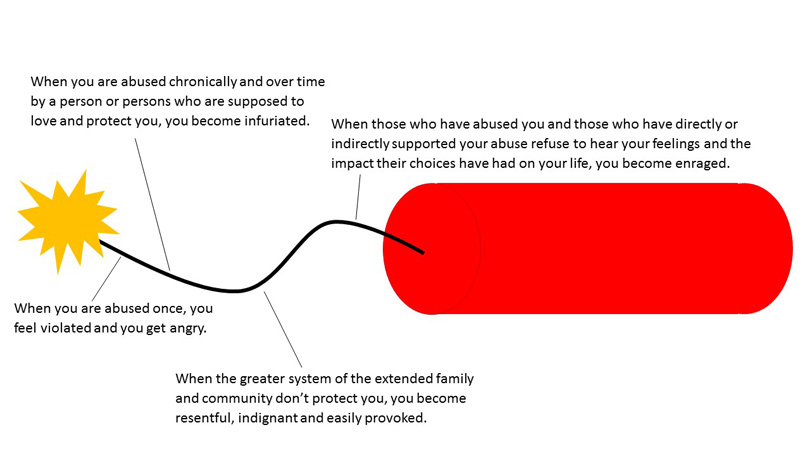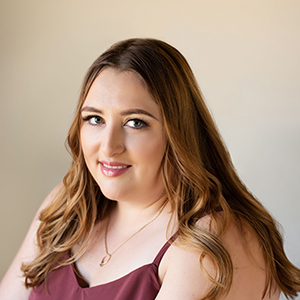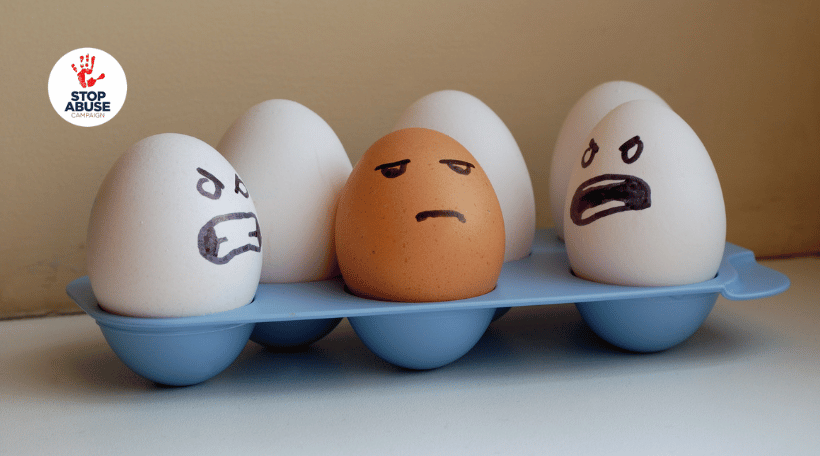Applying Abuse Survivor Learnings to Racism
I don’t know what it is like to be a black American and endure subtle or overt racism on a daily basis. I do know what it is like to be abused, and I believe there are a lot of similar themes that can help us all non-people-of-color be more compassionate so we can all move to a place of healing.
The image below outlines the escalating feelings of anger that come with being abused and how it can become explosive:

Victims of any type have a need to feel heard and understood. In fact, the therapeutic process in a nutshell is for someone to hear your feelings from a place of non-judgment because feelings need to be fully experienced and expressed so they can dissipate. In other words, the greatest gift you can give someone who has been abused or mistreated is to hear their anger and hurt, hold their feelings as valid and sacred, so as to make them as people feel heard and acknowledged. By doing this you will be giving them an invaluable gift toward their healing.
What holds us back from being able to do this? I believe the answer lies in how we relate to the emotion being expressed. We have no problem hearing someone’s feelings of joy or happiness. We have a slightly harder time hearing someone’s fear. We have an even harder time hearing someone’s sadness. But by far the hardest emotion of all to be able to hear and be with is someone’s anger. It is the emotion most find so unpleasant, they can barely claim their own feelings of anger inside themselves, let alone hear anger from someone else. It is even harder still and requires a strong degree of security, compassion, and humility to hear anger directed toward you from someone else. It is important to remember that anger is actually a healthy emotion. It is an emotion of protection that says “what has been done to me is wrong” because beneath all anger is hurt.
Any abused person who has confronted their abusers or people who have directly or indirectly supported their abuse can attest to the fact that the vast majority of these people refuse to believe they did anything wrong. In fact, they usually blame the victim and label the victim’s anger as the thing that is wrong. But asking a victim to curb their feelings of anger because it is unpleasant for you is just another way of victimizing them. You know the saying “beauty is in the eye of the beholder?” Well, when it comes to abuse and mistreatment, “anger and hurt is in the heart of the feeler.” The very fact that the hurt feelings are there make them valid, whether or not the person who inflicted those hurts believe they intentionally did anything wrong. So if you are reading this saying, ‘I don’t know why there is so much anger in the black community. I am not racist. I am not part of the problem,’ you are, because the very act of not hearing people tell you that you are part of the system that hurts them, makes you part of the problem.
Statistically speaking, abused kids grow up to be continually abused or to become abusers themselves. It all comes back to the anger discussed at the beginning of this post. When the anger is unheard and unresolved the anger travels down the fuse towards the explosive. And that explosive will either explode outwardly or inwardly. The violence and destruction we have seen in Minneapolis and many other places which has affected people’s livelihoods, etc. during an already difficult time is an outward explosion of legitimate anger. The popularized Martin Luther King, Jr. quote “a riot is the language of the unheard” is true. The way we can prevent continued explosions like this is to hear and feel the pain of others so we can collectively make change. That being said, I would compassionately point out to looters and rioters that when stored anger turns violent, it is acting more like a victimizer (like when the abused grows up to be an abuser themselves). What we need here is constructive conversation where non-people-of-color truly hear and feel what the black community has to say, which I imagine will include:
- This country has 250 years of slavery in our history. A lot of what made the US prosperous was built on the backs of slaves. That is our history and it will never not be our history. That history affected the culture of black Americans, who weren’t even considered people with basic human rights. Anger is an appropriate response to that history.
- Even after slavery was abolished, segregation was designed to make black Americans feel less than and was in place until shockingly recently: 1964, when the Civil Rights Act went into effect ten years after Brown v. Board of Education. 1964 is not that long ago. Most of us, our parents or grandparents were alive during segregation. Segregation negatively affected the trajectory of countless black Americans and prevented them from being who they could have been had segregation not be in place. Anger is also an appropriate response to that history.
- Just because it is no longer legal to discriminate doesn’t mean discrimination no longer exists. White privilege is a real thing. There is a very real lived experience that black Americans have to work twice as hard to get what white people would get with relative ease. There is very real fear in the black community that they will be killed by law enforcement just for being black. Anger is also an appropriate response to that state.
So while we don’t have to condone the violence and destruction, I believe we should be willing to hear the anger, even if it directed towards us who have indirectly contributed to or benefited from a system that oppresses and marginalizes others. It is no longer enough to not be a racist, we have to all become anti-racists.
Do you know your score?
Discover your ACE score and unlock a new understanding of your life. Take the test and gain insights into how your early experiences shape your well-being. Don't let your past define you – empower yourself with knowledge.

Azure Moyna
Writer and Coach
Azure Moyna is a writer and coach about issues relating to food, body, mental illness, familial dysfunction, societal treatment of overweight people, and the healing journey. Azure is the author of her memoir, Fullness.
